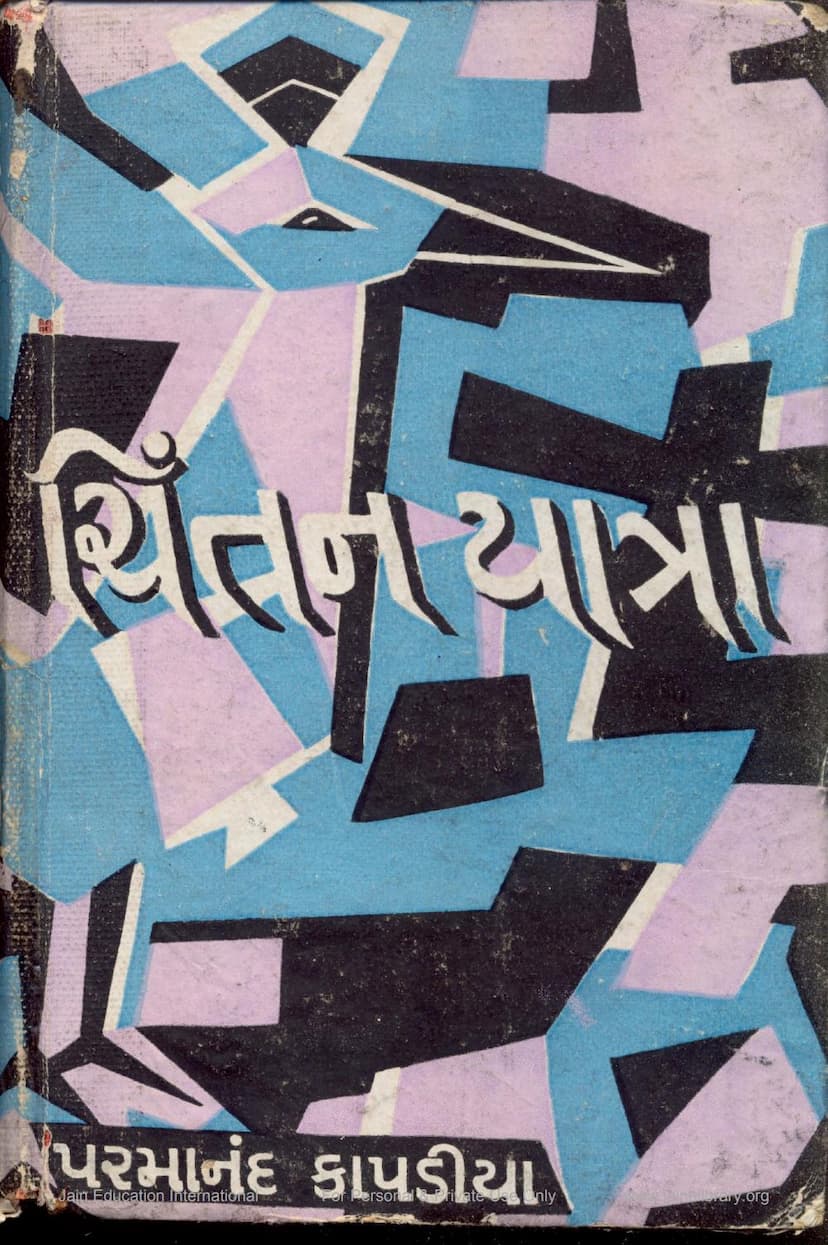Chintan Yatra
Added to library: September 1, 2025

Summary
The book "Chintan Yatra" (Thought Journey) by Parmanand Kapadia, published by Mumbai Jain Yuvak Sangh in June 1974, is a collection of articles by the author, a prominent Jain thinker and social reformer.
Key aspects of Parmanand Kapadia's life and philosophy, as presented in the book, include:
-
Early Life and Education: Born in 1893 in Ranpur, Saurashtra, into a Svetambara Murtipujak Jain family. His father, Kunvarji Anandji, was a respected citizen of Bhavnagar, deeply involved in Jain philosophy and Gujarati literature. Parmanand Kapadia pursued higher education in Mumbai, graduating with a BA and LL.B., but found the legal profession's compromises incompatible with his principles.
-
Entrepreneurship and Integrity: He ventured into business, initially facing losses. However, his unwavering integrity was evident when he sacrificed his share of ancestral property to uphold his moral commitment after business losses. Later, he successfully ran a jewelry business, earning respect for his honesty.
-
Family Life: Married Vijyabehen, with whom he had seven daughters. He valued his daughters equally to sons, ensuring they received high-quality education and fostered their individual talents. His letters from prison during the independence movement reveal his deep concern for his family's education amidst his own struggles.
-
Social Reform and Activism: Kapadia was a progressive thinker who challenged traditional and outdated Jain customs. He critically analyzed religious practices that lacked logic or aesthetic appeal. He was a key figure in establishing the Mumbai Jain Yuvak Sangh in 1928, advocating for:
- Proper utilization of religious endowments.
- Gender equality.
- Against compulsory widowhood.
- Challenging untouchability.
- His advocacy against child marriage led to strong opposition and even threats, but he remained steadfast. His bold critiques of Jain traditions and leaders led to his expulsion from the Ahmedabad Svetambara Murtipujak Jain Sangh.
-
Journalism and Intellectual Influence: He was the editor of "Prabuddh Jain" (Enlightened Jain) magazine, which became a significant platform for his fearless and insightful critiques on society, religion, and politics. He also edited "Upnagar Satyagraha Patrika" and "Tarun Jain." The magazine was later renamed "Prabuddh Jeevan" (Enlightened Life), reflecting his evolving spiritual journey. His writings were known for their clarity, logical argumentation, diverse topics, and analytical depth, showcasing him as an honest, just, insightful, and selfless social reformer, a visionary patriot, and a man of simple living who cherished truth and beauty.
-
Travel and Nature: Kapadia was an avid traveler with a deep love for nature. His travels, particularly to the Himalayas, are described in detail, highlighting his spiritual quest and appreciation for natural beauty. His travelogues, personal portraits, and obituaries in "Prabuddh Jeevan" were widely appreciated by his readers.
-
Philosophy and Ideals: He believed in the intrinsic connection between philosophy (Darshan) and life, emphasizing the journey from external observation to internal realization. He advocated for a life guided by truth, integrity, and universal love. His life mantra was that resisting injustice was a form of spiritual practice, and passivity in the face of wrongdoing was weakness.
-
Thematic Content of "Chintan Yatra": The book covers a wide range of topics reflecting Kapadia's intellectual and social concerns. The table of contents indicates discussions on:
- Philosophy and Life
- The Transitional Period in Aryavarta (India)
- Science and Religion
- War as an Outdated Life Principle
- The Evolution of Non-violence (Ahimsa)
- Non-vegetarian Diet
- The Conduct of Jain Monks in Modern Civilization
- Youth Activities
- The Growing Barbarity in Communal Opposition
- Correspondence with Gandhiji
- Travelogues of Kumaon Himalayas (Nainital, Ranikhet, Kausani, Almora, Bageshwar, Jaageshwar, Kasaar Devi, etc.)
- The Place of Women in Jainism
-
Legacy: Parmanand Kapadia's contributions were recognized by the Mumbai Jain Yuvak Sangh, which named their new assembly hall after him, and by the Lions Club, Rajkot, honoring him as a significant thinker in shaping national culture. He passed away in 1971, leaving behind a legacy of intellectual rigor, social reform, and unwavering commitment to his principles.
In essence, "Chintan Yatra" provides a comprehensive insight into the life, thoughts, and activism of Parmanand Kapadia, a multifaceted personality who significantly contributed to Jain thought and social progress in India.